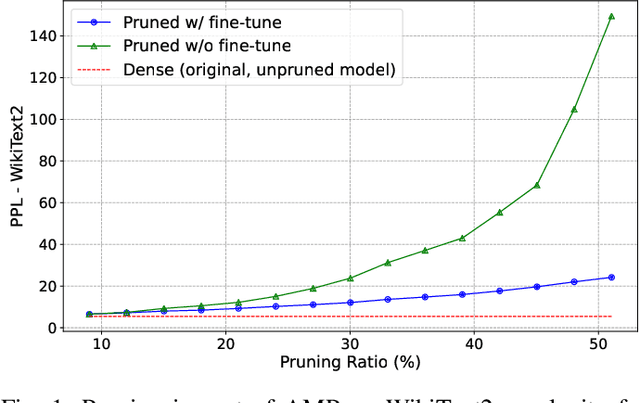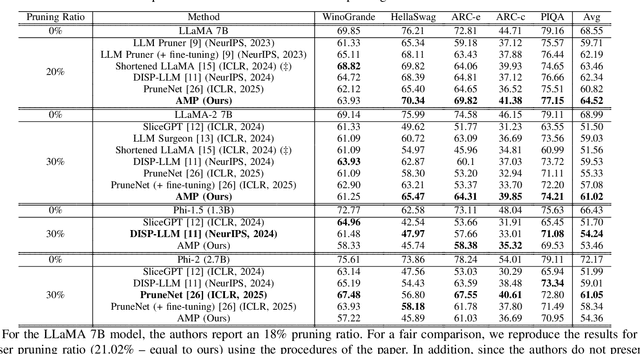Leandro Giusti Mugnaini
Compressing LLMs with MoP: Mixture of Pruners
Feb 05, 2026Abstract:The high computational demands of Large Language Models (LLMs) motivate methods that reduce parameter count and accelerate inference. In response, model pruning emerges as an effective strategy, yet current methods typically focus on a single dimension-depth or width. We introduce MoP (Mixture of Pruners), an iterative framework that unifies these dimensions. At each iteration, MoP generates two branches-pruning in depth versus pruning in width-and selects a candidate to advance the path. On LLaMA-2 and LLaMA-3, MoP advances the frontier of structured pruning, exceeding the accuracy of competing methods across a broad set of compression regimes. It also consistently outperforms depth-only and width-only pruning. Furthermore, MoP translates structural pruning into real speedup, reducing end-to-end latency by 39% at 40% compression. Finally, extending MoP to the vision-language model LLaVA-1.5, we notably improve computational efficiency and demonstrate that text-only recovery fine-tuning can restore performance even on visual tasks.
Efficient LLMs with AMP: Attention Heads and MLP Pruning
Apr 29, 2025



Abstract:Deep learning drives a new wave in computing systems and triggers the automation of increasingly complex problems. In particular, Large Language Models (LLMs) have significantly advanced cognitive tasks, often matching or even surpassing human-level performance. However, their extensive parameters result in high computational costs and slow inference, posing challenges for deployment in resource-limited settings. Among the strategies to overcome the aforementioned challenges, pruning emerges as a successful mechanism since it reduces model size while maintaining predictive ability. In this paper, we introduce AMP: Attention Heads and MLP Pruning, a novel structured pruning method that efficiently compresses LLMs by removing less critical structures within Multi-Head Attention (MHA) and Multilayer Perceptron (MLP). By projecting the input data onto weights, AMP assesses structural importance and overcomes the limitations of existing techniques, which often fall short in flexibility or efficiency. In particular, AMP surpasses the current state-of-the-art on commonsense reasoning tasks by up to 1.49 percentage points, achieving a 30% pruning ratio with minimal impact on zero-shot task performance. Moreover, AMP also improves inference speeds, making it well-suited for deployment in resource-constrained environments. We confirm the flexibility of AMP on different families of LLMs, including LLaMA and Phi.
Layer Pruning with Consensus: A Triple-Win Solution
Nov 21, 2024Abstract:Layer pruning offers a promising alternative to standard structured pruning, effectively reducing computational costs, latency, and memory footprint. While notable layer-pruning approaches aim to detect unimportant layers for removal, they often rely on single criteria that may not fully capture the complex, underlying properties of layers. We propose a novel approach that combines multiple similarity metrics into a single expressive measure of low-importance layers, called the Consensus criterion. Our technique delivers a triple-win solution: low accuracy drop, high-performance improvement, and increased robustness to adversarial attacks. With up to 78.80% FLOPs reduction and performance on par with state-of-the-art methods across different benchmarks, our approach reduces energy consumption and carbon emissions by up to 66.99% and 68.75%, respectively. Additionally, it avoids shortcut learning and improves robustness by up to 4 percentage points under various adversarial attacks. Overall, the Consensus criterion demonstrates its effectiveness in creating robust, efficient, and environmentally friendly pruned models.
 Add to Chrome
Add to Chrome Add to Firefox
Add to Firefox Add to Edge
Add to Edge